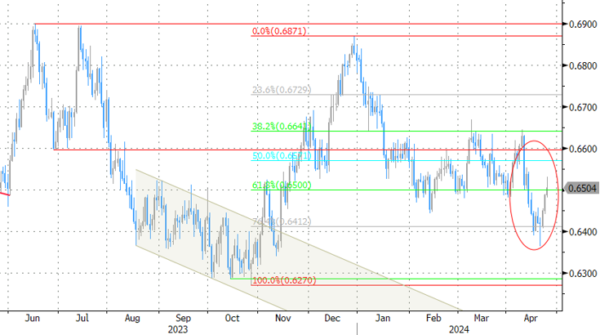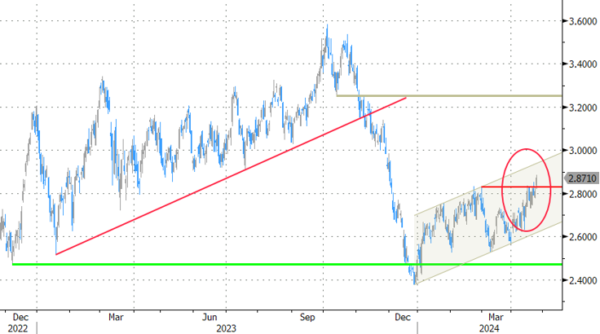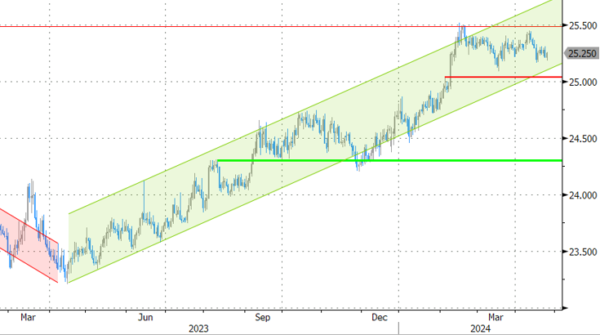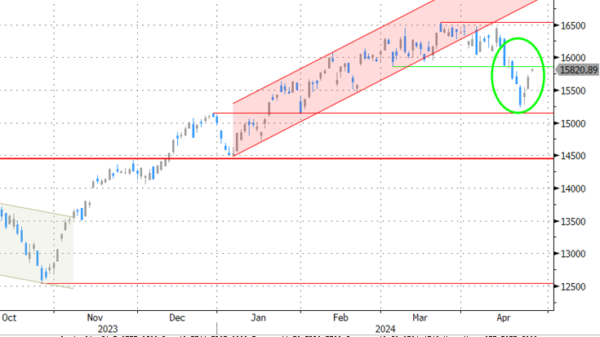Markets
Core bonds lost ground with German Bunds underperforming US Treasuries today. It would be unfair to link the former exclusively to the better-than-expected German Ifo indicator but it did support yields moving higher. The headline series improved from 87.9 to 89.4 with an increase in current conditions (88.9) but especially in the expectations component (87.7 to 89.9, the highest since April last year). The Ifo brought a similar “there’s light at the end of the tunnel” message as yesterday’s PMIs with the same distinction being made in the ailing (but with improving prospects) manufacturing sector and the services sector as the current stronghold. German yields add between 3.7 and 7.1 bps. We suspect the technical charts offered some help too with the long end moving beyond the precious YtD highs to hit new ones. The 10-y tenor is fast approaching the 2.6% resistance area (62% recovery on the 2023Q4 decline). US yields recover a good part from the PMI-induced losses yesterday. The long end underperforms with the likes of the 10y yield adding about 4.5 bps. Shorter maturities rise 1.5 bps. US data today included durable goods orders which printed bang or near in line with consensus. The headline series jumped 2.6% on the back of firmer commercial aircraft and defense-related orders. Core gauges, including the one used in calculating the investment component in GDP readings, printed at 0.2%.
The Australian dollar outperforms in the G10 currency landscape today. Higher-than-expected Q1 inflation numbers released this morning question the Reserve Bank of Australia’s capacity to cut rates already this year. The market implied probability dropped from 93% to 46%, pushing Australian yields and the currency higher. AUD/USD appreciated to 0.653 but met with though resistance from the 200dMA there. The pair is currently trading back below 0.65. The US dollar trades with a minor strengthening bias. EUR/USD turned just south of 1.07, DXY ekes out a gain to 105.84. USD/JPY hit an intraday high of 155.17 – a new 34y high – but quickly swung back sub 155 again as fears linger further JPY deprecation this time may actually spark FX interventions by Japanese officials.
News & Views
Czech confidence improved both amongst consumer and among businesses. The composite indicator rose from 94.2 to 97, the best level since April 2023. Business confidence improved from 93 to 95.6 with solid increases in industry and selected services. Sentiment deteriorated in construction and (slightly) in trade. Consumer confidence increased for the fourth time in a row to 103.8. The number of respondents expecting a deterioration in the overall economic situation in the next twelve months decreased and less consumers assess their current financial situation worse than in the previous twelve months. The number of respondents expecting a deterioration in their financial situation in the next twelve months is unchanged. The share believing that the current time is not suitable for making major purchases was unchanged compared to the previous month. Better activity data and a cautious easing policy by the Czech national bank (CNB) for now only provided limited support for the koruna. EUR/CZK is trading near 25.25, still not that far from the lows recorded in February (25.51) and (25.44) earlier this month.
After rising for two consecutive months, the monthly business confidence indicator of the National Bank of Belgium fell in April. The noticeable rise in confidence seen in manufacturing in March has taken a big hit this month. The loss of confidence was mainly due to a significantly less encouraging assessment of stock levels and a sharp downward revision of demand expectations. Employment expectations were also downgraded, but to a much lesser extent. Confidence also weakened in the business-related services sector, albeit to a lesser extent. In the building industry and trade, the indicator is essentially holding steady. Despite the setback in April, the indicator of the underlying economic trend continues to rise slightly. The capacity utilization rate in the manufacturing industry marginally decreased quarter-on-quarter, from 74.4% in January 2024 to 73.8% in April 2024.
Graphs
AUD/USD: Aussie dollar extends recent recovery on stronger-than-expected Q1 inflation figures

European 10y swap yield pushes through to new year-to-date high as evidence of economy bottoming out grows

EUR/CZK: Czech crown not impressed by improving soft and hard economic data and restrained monetary easing

Nasdaq leaves correction mode for now after finding support at the start of the week










